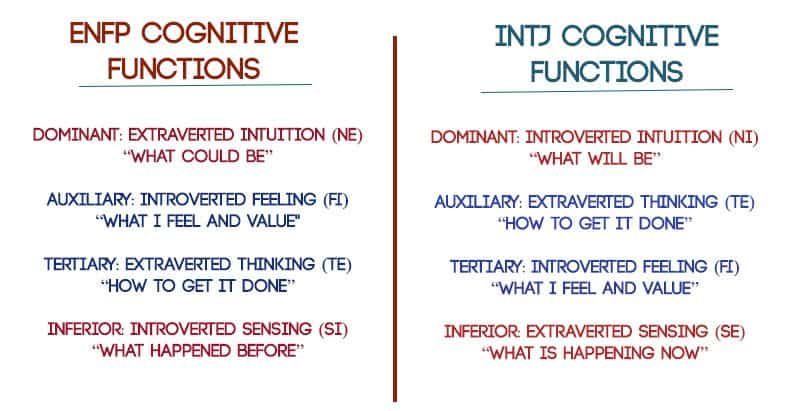For upon |I recently got a reader request for a post about the joys and struggles of ENFPs and INTJs in relationships. I’m thrilled to research this pairing because they seem to have a natural attraction, but there aren’t many resources out there for them.
When it comes to dating, marriage, and attraction, most of us are attracted to someone who is strong in areas that we are weak. “Opposites Attract” is a cliche for a reason; we are looking for a balancing effect in our relationships. We want someone who can be tough when we are weak, someone who can be warm when we are cold. These things provide a complete feeling in a relationship, and the differences also create a natural curiosity and sense of intrigue for each partner.
Not sure what your personality type is? Personality Hacker has the most accurate free online personality indicator I’ve been able to find. Click here to take it.
Why Do ENFPs Fall for INTJs (and vice versa)?
ENFPs and INTJs may only share one letter preference in common (N for intuition) however, they share two common cognitive functions; Introverted Feeling and Extraverted Thinking (see below).

This means that both ENFPs and INTJs not only perceive the world through intuition, they also have a common feeling and thinking function, although in a separate order. Where the ENFP will have a higher knowledge and awareness of his/her own emotions and values, the INTJ will have a higher awareness of the logical approach and efficient task completion. If you look at the cognitive function image, you can see that INTJs use Fi in the tertiary position, only one step down from the ENFPs position. The same goes for Extraverted Thinking, the ENFP has Te in the tertiary position, only one step down from the INTJs Te.
What Does This Mean?
INTJs and ENFPs are going to hit it off and experience a natural spark because they will both live and thrive in the world of ideas, possibilities and meanings. They will feel a nearly “inside out” approach to intuition. The INTJ will have a singular focus, intense and deep, although they may think about more possibilities than they say. The ENFP will have a broad focus, seeing numerous possibilities everywhere. The INTJ may feel that the ENFP is speaking out loud intuitive thoughts and feelings that they have internalized. The ENFP may feel that the INTJ is grasping a deeper and more focused approach and insight to their ideas and possibilities, causing them to have a clearer focus and perception themselves.
Life is full of possibility and excitement for the ENFP, and they have an infectious enthusiasm that draws the INTJ in. The ENFP can open up the INTJs mind to numerous possibilities and angles they may have missed before, and the INTJ can harness the ENFPs ideas and insights and give them a clearer focus along with a plan to make them come to life. The ENFP can be a constant idea-generator whereas the INTJ can be the one who harnesses the best of those ideas, creates the plan, and together they bring the idea to life. Both partners are going to be focused on the big picture, the future, and they are going to be excited by underlying meanings, symbols, and possibilities.
Benefits of the Thinking/Feeling Difference

This difference can create a spark of interest as each one is strong in the area the other is weak. This can also be a source of frustration (as we’ll discuss later). INTJs are drawn to the ENFPs warm, outgoing nature, and enthusiasm. ENFPs are naturally playful, open-minded, and blessed with a good sense of humor. INTJs find in the ENFP a warm, comforting, and delightful friend and partner. The ENFP partner can help the INTJ to get a better grasp of their own feelings, values, and emotions.
ENFPs, in turn, are drawn to the INTJs resolve, intellectual passion, and driven nature. INTJs have an intense focus and a natural efficiency and goal-oriented nature that is captivating to the ENFP. The INTJ can help the ENFP to be more objective in their decisions and give logic-driven perspectives that may help the ENFP to further achieve their dreams.
Benefits of the Judging/Perceiving Difference
ENFPs are attracted to the INTJs resolve and commitment. INTJs are very single-minded in their vision, and are determined to meet their goals. They have a strong ability to hold their ground and stick to their schedule and plan without being swayed. This is admirable to the ENFP, who often feels tossed and turned by their many ideas and visions for the future and has a harder time settling on just one. The INTJ can help the ENFP stick to a time management plan and can make their dreams more of a possibility with their efficiency at setting up plans and timelines.
In the same respect, INTJs are attracted to the open-minded and inspirational nature of the ENFP. The ENFP can introduce new angles and perspectives that the INTJ in their intense, single-minded vision may have missed. In their singular focus and their penchant for efficiency, INTJs can miss details or alternatives that can greatly improve the creativity and excellence of their work. ENFPs can help broaden their scope and together they can achieve almost anything they set their minds to.
Benefits of the Extroversion/Introversion Difference
ENFPs are considered one of the least extroverted extroverts, and for this reason there’s not as big of a contrast with this pairing as there would be with an INTJ and certain other extroverts. You can see this in the MBTI® Manual in a section about the different types and their values. A national sample was asked to indicate how important 11 values were in their lives on a scale of “Very important”, “Somewhat Important”, or “Not Important”. ENFPs listed Autonomy as their fourth most important value. ESTPs and ENTPs are the only other extroverts who listed autonomy as one of their top 5 most important values. ENFPs shared autonomy as a value with INTJs, along with home/family, health, and financial security.
The INTJ can really enjoy the ENFPs extroversion. That whole opposite attraction has a strong pull here! INTJs are fascinated by the ENFPs ability to liven up the atmosphere, and are impressed by their skill at connecting with people in an insightful way.
ENFPs in turn are attracted to the quiet, intellectual nature of the INTJ. In the INTJ they find someone calm and sage-like to come home to. They can enjoy curling up with a good book together, or discussing all their ideas and dreams over a cup of coffee. There is something perceptive and intense about the INTJs quiet, focused nature. ENFPs are also very intellectual, so these two types can really get into some fascinating, drawn-out conversations about the meaning of life, philosophy, or any other number of topics.
The Struggles of the ENFP/INTJ Relationship

One of the biggest struggles with the ENFP/INTJ relationship is their different social needs. Yes, ENFPs are less extroverted than many, but they still greatly desire interaction with the outside world. They are stimulated by meeting new people and experiencing new atmospheres. These interactions trigger their dominant Extraverted Intuition and allow them to be inspired. They will feel stifled if they are cooped up too much in the house and not allowed to meet new and interesting people or experience and explore places they’ve never been before.
INTJs have dominant Introverted Intuition. They need a lot of time alone; in fact, INTJs are one of the most introverted introverts. In order for them to really be in their element as Ni-dominant individuals they need plenty of space, quiet, and tranquility. They will feel caged in and over-stimulated if they have to spend too much time engaging with others. They especially hate interruptions to their projects, whereas ENFPs are often excited by interruptions and distractions and see them as an opportunity to explore something new. INTJs can enjoy visiting new places and seeing new sights, they can even enjoy the occasional social outing, but they need to be allowed much more time to recharge than many other types.
Roadblocks in Communication
Communication struggles can also be an issue in this pairing. ENFPs are very concerned with harmony, and will try to avoid conflict as much as possible. They tend to take criticism personally and may want more positive affirmation than the INTJ naturally provides. INTJs tend to be blunt and straightforward with their criticisms, and they can unintentionally hurt their partners’ feelings.
ENFPs, as extroverts, tend to process their thoughts out loud most of the time. Because their dominant function is Extraverted Intuition, they may want to ‘talk out’ their ideas, their insights, all the possibilities around them. They may also want to be checking in regularly on their partner to make sure everything is good in their relationship. The INTJ, in reverse, internalizes many of their thoughts and ideas, and tries to stick to one idea and get rid of any distractions to that idea. The ENFP can seem intrusive to the INTJ and the INTJ can seem cold and harsh to the ENFP when their communication preferences collide.
INTJs also don’t share their feelings as readily as ENFPs do. The ENFP is much more aware of their feelings because introverted feeling is their second most conscious function. INTJs in contrast are less aware because introverted feeling is in their tertiary position. It can take them a while to really understand or pinpoint how they feel and so they can feel irritated if the ENFP is regularly asking them about their feelings or asking them to exhibit emotions that don’t come as naturally to them. This can cause the INTJ to feel pressured to regularly be accessing a function that isn’t in their natural comfort zone, and this can also cause the ENFP to feel that they can’t connect emotionally as much as they would like.
One upside to the feeling/thinking difference is that in mid-life most people develop their tertiary function quite a bit. This means that the INTJ will be developing Introverted Feeling in their thirties and forties, and the ENFP will be developing Extraverted Thinking in their thirties and forties. As a result, if these couples can stick it out they often find themselves forming new bonds in mid-life and being able to express themselves better to each other.
Different Planning Styles

As perceivers, ENFPs like to keep their plans open-ended for as long as possible. They like to have the freedom to cancel, switch plans, or spontaneously do things as inspiration strikes. They love surprises and tend to be impulsive. One of the great things about this quality is that it allows them to find new inspirations for their life and their projects that they might have missed otherwise. However, this can cause clashes with the INTJ.
The INTJ is far different in their planning style than the ENFP. They like things to be planned out ahead of time, and they like to have closure on all their decisions. Leaving things open-ended stresses them out, and they usually hate surprises. They enjoy having a structure in their life, knowing what to expect, and having everything organized and neatly planned. As a result, these partners can wind up driving each other out of their respective comfort zones, creating chaos and conflict.
This difference can, at times, be a good thing. The ENFP can help the INTJ to see new perspectives and introduce them to new experiences they may actually enjoy. The INTJ can help focus the ENFPs ideas and find a sense of calm and direction in their life.
Overcoming the Struggles in an ENFP/INTJ Relationship:
For the ENFP Partner:
Give your partner plenty of time to think and be alone with their musings. Steer clear of interrupting them, as interruptions are a huge source of frustration for INTJs.
Respect the INTJs need for routine and planning and try not to cancel too many plans at the last minute.
Try to take an interest in the things that your partner is interested in. Chances are, this can be the source of many amazing conversations and a greater friendship.
Understand that when your partner gives criticism they aren’t trying to hurt you. They naturally see flaws and things that could be improved, but they mean no ill-intent by offering advice or saying what they think should be changed. If this does bother you regularly, just tell them. Make sure they know and try not to hold in bitterness regarding this.
Try not to push your partner into too many social situations. Small gatherings with just a few close friends are almost always preferred by INTJs. If you feel the need to socialize more but your partner isn’t interested, feel free to go out and socialize without them. This way you get your energy needs met without pulling the INTJ out of his/her source of energy (introversion).
Try to follow through on things you say you’ll do and try to be on time to any dates or appointments you’ve made.
Don’t expect the INTJ to be spontaneous often. Try to schedule in time for special things you want to do together so they aren’t caught off guard.
Try to open your mind to the perspective the INTJ is offering. They have a great ability to stay objective and see logical, efficient ways to get things done. If there’s a decision you’re struggling with, the INTJ can be a wonderful confidante and advisor who will give you an objective and insightful answer. Ni-dominant types are great at knowing what steps to take to achieve a future outcome. Definitely take advantage of this unique ability of theirs!
For the INTJ Partner:
Try to respect your partners feelings and emotions, and try to be as open about your own as possible.
Try to make time for social engagements now and then. It’s more comfortable to retreat into your own private space, but it can make the ENFP feel lonely. You don’t have to overdo it, but going to an occasional social event can help to make your ENFP feel loved and happy to be able to share that experience with you.
Be especially attentive when your partner is sharing their emotions.
Try to give positive affirmation to your partner regularly, especially when they do something nice for you.
Emphasize positive aspects of your partner before giving criticism, and remember that they tend to take criticism personally so try to give it gently.
Be up front and open about things that bother you so that you don’t let things simmer inside for too long and then explode. Try to express your needs, especially when it comes to planning things or getting some time alone.
Try to open your mind to the perspectives the ENFP is offering. Ni-dominant types tend to have an intense focus on one way to get things done, or one project and they can be irritated by deviations from that plan (I know, I’m an INFJ), but try to take a moment to really listen to what the ENFP is saying. ENFPs are incredible at seeing creative and imaginative alternatives and possibilities. They may have an insight or idea that could really improve your life!
The Feeling Male with the Thinking Female

Female INTJs and male ENFPs enjoy a very unique bond, but there are some special qualities to this particular relationship. Female INTJs often face many societal pressures to conform to a more ‘feeling’ role. Men, likewise, are often pressured to conform to a more ‘thinking’ style. These two types often face difficulties growing up, possibly being made to feel that they are somewhat inadequate. The woman may be told she’s not ‘ladylike’ or nurturing enough, and the male may get told he needs to ‘man up’ more because he happens to show emotions. In relationships it’s important to be aware of the difficulties that each type may have faced because of outside pressures. ENFP men may have had to stifle a lot of their emotions and sensitivities because of external pressures, and INTJ women have probably had to develop a more feeling type role. As a result, many ENFP males seem less ENFP-like than ENFP females. In the same respect, many INTJ females seem less extreme in their INTJ nature externally than INTJ men.
“I get told I’m too sensitive a lot, and people conclude that because I’m a man showing emotions that I’m a “wimp”. ENFP men are not wimps. I can provide plenty of intellectual stimulation and I’ve overcome a lot in my life. I feel a great pressure not to talk about my emotions or feelings, and I hope that one day when I’m in a relationship I don’t have to do that anymore. That I can just be me.”
– Ethan, an ENFP male
INTJ women face many of the same struggles.
“I was raised in an ultra-conservative and traditional family where women were supposed to be the nurturers and empaths. Not only were those seen as feminine traits but it was assumed that a girl would have and be drawn to only certain things because of her sensitive and emotional nature.
This never felt like it fit me and made me feel something was wrong with me.”
– Rebecca, an INTJ female
It’s important to be aware of the issues these two types face so that both partners are aware of the obstacles they may have had to overcome. It’s important for both types to allow their partner to be exactly who they are, and not feel stifled or that they have to bury parts of themselves anymore. A happy relationship is built on trust, and part of that trust is being able to know without a doubt that you can embrace your personality wholeheartedly without fear of judgment. This means that it’s especially important to not make fun of things you see your partner doing that don’t fit your mental image of what is ‘ladlylike’ or ‘manly’. ENFP men can be the ones to not push the INTJ female into a cookie-cutter, sensing feeling role. INTJ women can be the one who understands that the ENFP male has a strong emotional intelligence and appreciate that about them fully.
What Do You Think?
Do you have any thoughts to add to this article or any suggestions for ENFPs and INTJs in relationship? Let me know in the comments
The article was originally published here.


Comments are closed.